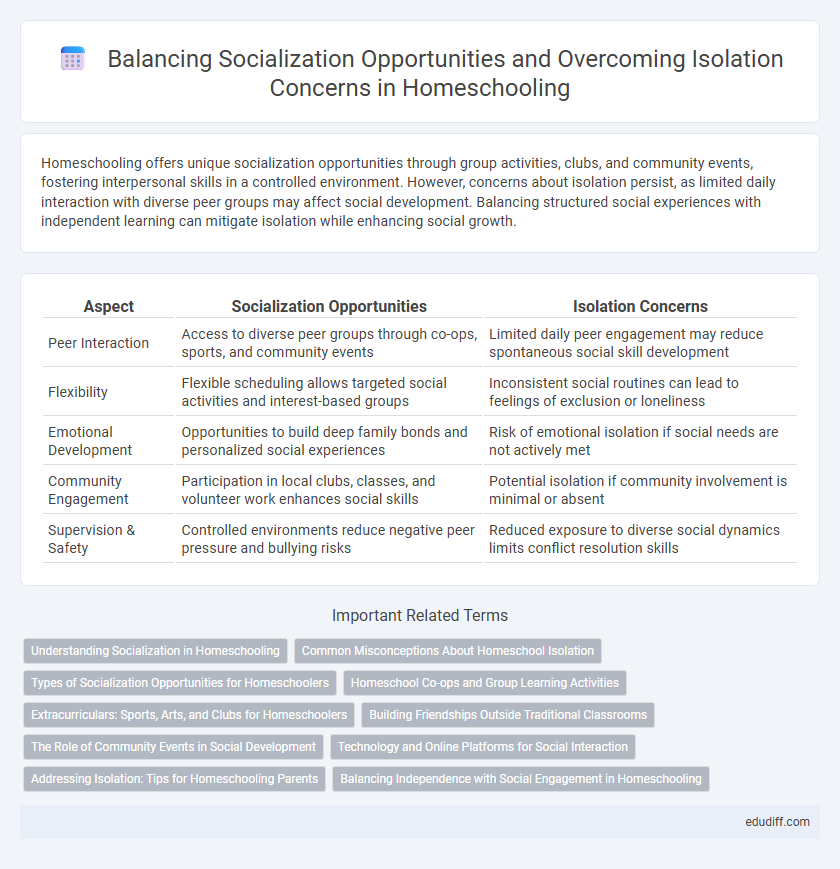Homeschooling offers unique socialization opportunities through group activities, clubs, and community events, fostering interpersonal skills in a controlled environment. However, concerns about isolation persist, as limited daily interaction with diverse peer groups may affect social development. Balancing structured social experiences with independent learning can mitigate isolation while enhancing social growth.
Table of Comparison
| Aspect | Socialization Opportunities | Isolation Concerns |
|---|---|---|
| Peer Interaction | Access to diverse peer groups through co-ops, sports, and community events | Limited daily peer engagement may reduce spontaneous social skill development |
| Flexibility | Flexible scheduling allows targeted social activities and interest-based groups | Inconsistent social routines can lead to feelings of exclusion or loneliness |
| Emotional Development | Opportunities to build deep family bonds and personalized social experiences | Risk of emotional isolation if social needs are not actively met |
| Community Engagement | Participation in local clubs, classes, and volunteer work enhances social skills | Potential isolation if community involvement is minimal or absent |
| Supervision & Safety | Controlled environments reduce negative peer pressure and bullying risks | Reduced exposure to diverse social dynamics limits conflict resolution skills |
Understanding Socialization in Homeschooling
Homeschooling offers diverse socialization opportunities through community groups, extracurricular activities, and cooperative learning environments that foster peer interaction and skill development. Understanding socialization in homeschooling involves recognizing that quality and frequency of social engagement, rather than traditional school settings, determine social growth and emotional well-being. Concerns about isolation can be mitigated by intentional participation in social networks and collaborative experiences tailored to individual learning needs.
Common Misconceptions About Homeschool Isolation
Homeschooling often faces misconceptions that it leads to social isolation, yet many homeschooled students engage in diverse social activities such as co-ops, sports teams, and community groups. Research from the National Home Education Research Institute (NHERI) shows that homeschooled children typically have social skills on par with or superior to their public-schooled peers. These findings highlight that homeschool socialization opportunities are structured and varied, dispelling myths of isolation.
Types of Socialization Opportunities for Homeschoolers
Homeschoolers access diverse socialization opportunities through community sports leagues, co-op classes, and local clubs, fostering peer interaction and skill development. Participation in volunteer work and art or music groups further enhances social engagement, promoting teamwork and cultural exposure. Regular involvement in field trips and extracurricular activities supports emotional growth and broadens social networks beyond the home environment.
Homeschool Co-ops and Group Learning Activities
Homeschool co-ops and group learning activities offer valuable socialization opportunities by allowing homeschooled children to engage with peers in collaborative, structured environments. These settings promote teamwork, communication skills, and diverse social interactions, mitigating common isolation concerns associated with homeschooling. Participation in regular group activities enhances emotional development and fosters a sense of community among homeschool families.
Extracurriculars: Sports, Arts, and Clubs for Homeschoolers
Extracurricular activities such as sports teams, arts classes, and clubs provide homeschoolers with vital socialization opportunities, fostering teamwork, creativity, and peer interaction outside the academic environment. Participation in community-based organizations like homeschool co-ops, local theater groups, and sports leagues helps mitigate concerns about isolation by building friendships and enhancing communication skills. These structured social settings equip homeschool students with diverse experiences essential for emotional and social development.
Building Friendships Outside Traditional Classrooms
Homeschooling provides diverse socialization opportunities through community groups, extracurricular activities, and local clubs, enabling children to build meaningful friendships beyond traditional classrooms. Parents often facilitate peer interactions by organizing playdates, team sports, and cooperative learning circles, mitigating isolation concerns. These intentional social environments help homeschooled students develop strong social skills and lasting relationships while enjoying flexible and personalized education.
The Role of Community Events in Social Development
Community events serve as essential platforms for homeschooled children to develop social skills and build meaningful relationships. Participation in local sports leagues, art classes, and group field trips enhances peer interaction and reduces feelings of isolation often associated with homeschooling. These structured social environments foster communication, teamwork, and emotional intelligence vital for well-rounded social development.
Technology and Online Platforms for Social Interaction
Technology and online platforms provide homeschoolers with diverse socialization opportunities, enabling connections through virtual clubs, classes, and interest-based communities. These digital tools mitigate isolation concerns by facilitating regular interactions and collaborative learning experiences beyond geographic limitations. Effective use of technology promotes balanced social engagement, enhancing the homeschool environment's social dynamics.
Addressing Isolation: Tips for Homeschooling Parents
Homeschooling parents can combat isolation concerns by actively engaging their children in local co-op classes, sports teams, and community organizations to foster meaningful peer interactions. Regular participation in group activities and field trips enhances social skills and emotional development, counteracting potential feelings of loneliness. Establishing consistent social routines ensures homeschooled children develop strong interpersonal connections and build confidence in diverse social settings.
Balancing Independence with Social Engagement in Homeschooling
Homeschooling offers unique socialization opportunities through community groups, co-ops, and extracurricular activities, promoting independence while ensuring meaningful peer interactions. Parents can balance the potential for isolation by deliberately integrating structured social engagements, such as sports teams or interest-based clubs, that develop communication and teamwork skills. Structured socialization in homeschooling nurtures both autonomy and a well-rounded social experience critical for child development.
Socialization Opportunities vs Isolation Concerns Infographic

 edudiff.com
edudiff.com